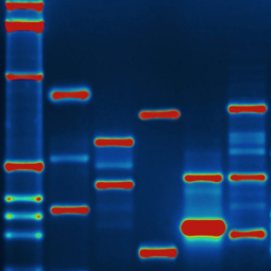Degree of African ancestry may influence gene expression levels

Last Updated on January 26, 2020 by Joseph Gut – thasso
Basically, the study here asked if the shade of “gray” meaning the skin tones in African Americans from very light to rather dark matter when it comes to the level of expression of certain genes? The answer seems to be yes. Thus, there were at least 28 genes found whose expression (i.e., atteined mRNA level) varied with the proportion of African ancestry. These genes were linked to 220 diseases or clinical outcomes such as coronary heart disease and triglyceride levels. Some of the identified genes that vary with African ancestry are related to drug metabolism (CYP2C19), renal disease (APOL1), and an important target for cancer therapy (VEGF).
The exact molecular mechanisms for the variations in gene expression in are not yet clear. One contributing factor might be the phenomenon of transcriptional bursting where in diploid cells, where each single gene is represented by two allelic copies (which need not be identical, but may be allelic variants) and where one of the two alleles may be expressed preferentially and to much higher degrees than its allelic counterpart.
Such mechanisms may be very important in populations like African Americans and other admixed populations like Latinos, but of course of “Caucasians” and Asian populations and lead to wide variability in both responses to drug treatments and genetic predisposition to disease. Unfortunately these types of data are sorely missing in most of the public databases so far.
See this short sequence on genetics of populations:

 New research shows now there might a totally unexpected factor contribute to such variabilities in disease frequencies too. The percentage of African ancestry in a person’s genome seems to determine the level (i.e. the level of mRNA) at which certain genes are expressed. The discovery could offer insight into different risks of diseases as well as into different responses to medications, particularly in individuals of African Americans descent.
New research shows now there might a totally unexpected factor contribute to such variabilities in disease frequencies too. The percentage of African ancestry in a person’s genome seems to determine the level (i.e. the level of mRNA) at which certain genes are expressed. The discovery could offer insight into different risks of diseases as well as into different responses to medications, particularly in individuals of African Americans descent.